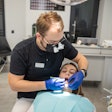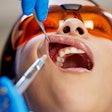Merck has been ordered to pay $8 million in compensatory damages to a 72-year-old woman who claimed the company's bisphosphonate drug Fosamax caused her to develop osteonecrosis of the jaw (ONJ) and related dental problems.
Shirley Boles' original lawsuit ended in a mistrial last September. But on June 25, a jury in New York found in favor of Boles, calling Fosamax -- routinely used to treat osteoporosis -- "defectively designed" and "unreasonably dangerous," according to news reports.
Merck stated in a June 28 press release that it believes the awarding of compensatory damages was unjustified and excessive.
"We disagree with the jury's verdict. We believe the jury verdict was a result of plaintiff's counsel's inflammatory and prejudicial remarks," said Paul Strain of the Venable law firm, outside counsel for Merck, in the release. "The plaintiff was at increased risk for dental and jaw problems even if she was not taking Fosamax."
Boles testified that she used Fosamax from 1997 to 2006 and that she suffered various jaw problems and complications following two tooth extractions in June 2002, including a several-day hospitalization in 2004 to treat her condition.
During the trial, Merck produced evidence showing that the plaintiff had medical problems that cause people to develop jaw problems, regardless of whether they were taking Fosamax. She had significant periodontal disease and a history of smoking up to a pack of cigarettes a day, Merck said.
In addition, Merck said it presented evidence that it acted responsibly in researching and developing Fosamax as well as monitoring the medicine since it has been on the market. The company's clinical trials, conducted both before and following approval, have involved more than 28,000 patients, including more than 17,000 treated with Fosamax. Merck also presented evidence that it provided appropriate and timely information about Fosamax to the medical, scientific, and regulatory communities and consumers.
"Both the finding and the amount of the compensatory damages are against the weight of the evidence," said Bruce Kuhlik, executive vice president and general counsel of Merck, in the release. "We believe the evidence showed that Fosamax did not cause the plaintiff's injury and that it is a safe and effective medication that was properly designed. While this is not the outcome we had hoped for, we remain fully committed to defending these cases."
Merck is currently facing more than 1,000 similar lawsuits. Boles' was one of three so-called bellwether cases being heard in federal court in Manhattan. One case was thrown out last year, and a jury found in favor of Merck in another case in May. A fourth is set to go to trial in federal court in November.
Copyright © 2010 DrBicuspid.com



















